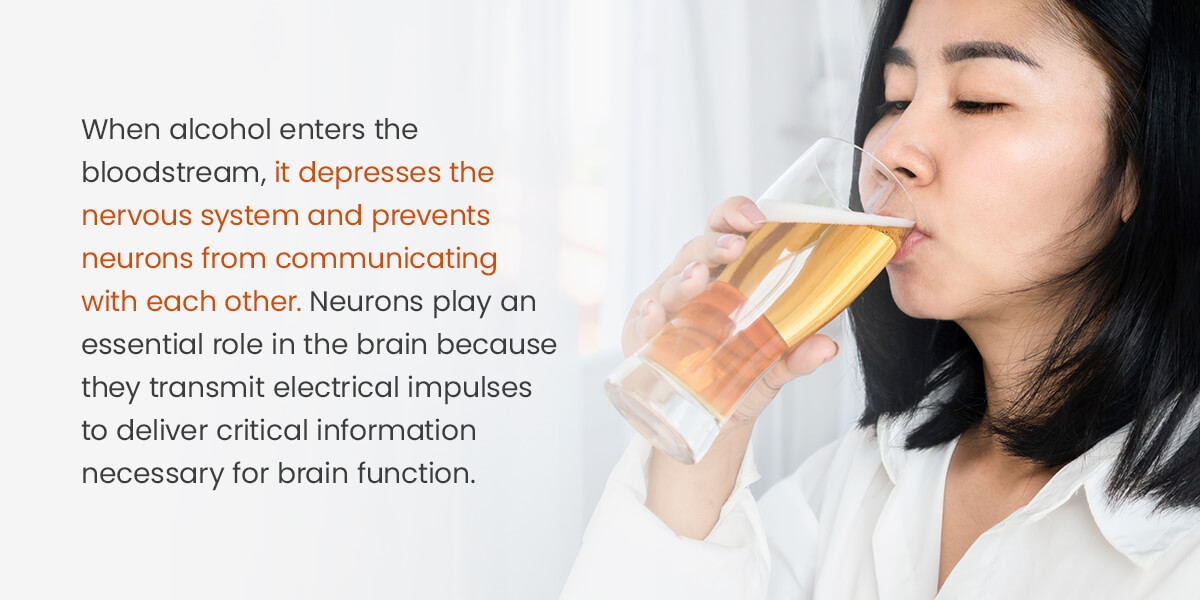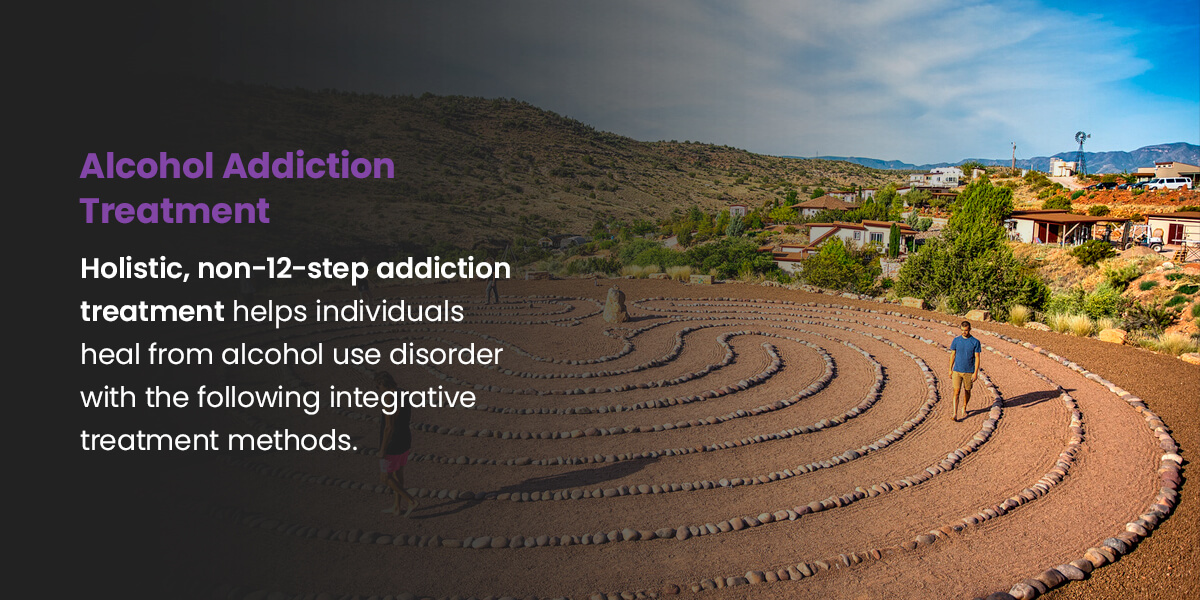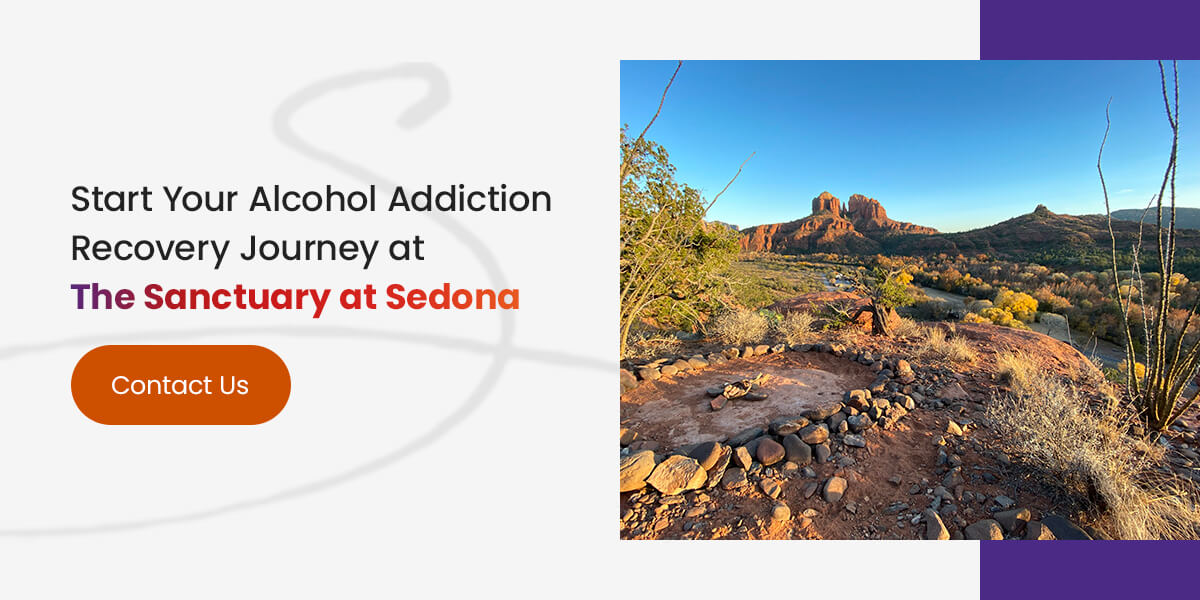I Only Drink Alcohol on the Weekends — Am I Addicted?
Occasional and weekend alcohol consumption can develop into an alcohol use disorder before you realize it. Alcohol alters the brain’s function and structure, leading many people into a cycle of intoxication, withdrawal and cravings. Understanding the signs of alcohol addiction allows you to recognize when you or a family member need support.
Holistic alcohol addiction treatment is a practical recovery approach that treats the whole person and addresses underlying conditions that contribute to substance use disorder. Learn about the signs and risks of alcohol use disorder to determine when treatment is necessary.
Table of Contents
- Am I Addicted to Alcohol?
- The Long-Term Impact of Alcohol Use
- How Alcohol Addiction Develops
- Alcohol Addiction Withdrawal Symptoms
- Why Alcohol Use Always Becomes More Frequent Than You Planned
- Signs of Alcohol Addiction
- The Dangers of High-Functioning Alcohol Addiction
- Alcohol Addiction Treatment
Am I Addicted to Alcohol?
Understanding addiction is essential to know if you or a loved one has an alcohol use disorder. Not all individuals who drink alcohol are addicted to it, but addiction can develop quickly. Alcohol addiction is a chronic condition that causes people to consume alcohol compulsively, lack intake control and experience anxiety or irritability when they lack access to alcohol.
While drinking alcohol occasionally or on the weekends may not necessarily mean someone is addicted, it can signify a current or future drinking problem. Recognizing the red flags of alcohol addiction is crucial because it can help you notice when you or a loved one needs treatment, and it can also help you understand the dangers of regular drinking and prolonged alcohol use.
The Long-Term Impact of Alcohol Use
Alcohol adversely affects the brain and body, and excessive consumption can lead to severe complications. Regular alcohol use can cause long-term health conditions such as the following.
- Digestive complications: Alcohol can impair the small and large intestines’ muscle movement, causing diarrhea. It can also damage muscles around the stomach, cause acute gastrointestinal bleeding and hinder gastric acid secretion.
- Malnutrition: Alcohol can gradually cause mucosal damage that prevents proper nutrient digestion, preventing the gut from absorbing essential nutrients and leading to malnutrition.
- Liver disease: Excessive alcohol consumption can lead to alcoholic liver disease. This disease develops in three stages — fatty liver disease, hepatitis and cirrhosis. People can typically reverse fatty liver disease and hepatitis with proper nutrition, alcohol abstinence and medical treatment, but liver damage is irreversible once cirrhosis develops.
- Cancer: Heavy alcohol use increases the risk of cancer in the liver, esophagus, throat, breast, rectum, colon, voice box and mouth.
- Heart conditions: People who regularly drink excessively may develop heart conditions such as heart disease or high blood pressure. Alcohol use also increases a person’s odds of experiencing a stroke.
- Cognitive conditions: Excessive alcohol use affects the brain’s memory and learning centers, which can cause cognitive decline and make dementia more likely.
- Immune system: Alcohol use weakens the immune system over time and increases the risk of developing various illnesses.
- Mental health conditions: Frequent heavy drinkers often experience mental health conditions such as anxiety and depression.
While alcohol’s adverse health impacts are concerning, it’s also crucial to understand that it can cause significant social complications. Over time, excessive drinking can interfere with jobs and relationships, potentially leading to relationship conflict, family separations and unemployment.
How Alcohol Addiction Develops
Alcohol impacts the brain by activating its pleasure centers and suppressing negative emotions. It can gradually change the brain’s function and structure, causing people to repeat a harmful cycle of intoxication, withdrawal and anticipation. This cycle of alcohol addiction occurs in three brain sections — the basal ganglia, extended amygdala and prefrontal cortex.
When alcohol enters the bloodstream, it depresses the nervous system and prevents neurons from communicating with each other. Neurons play an essential role in the brain because they transmit electrical impulses to deliver critical information necessary for brain function. When alcohol disrupts this communication, it hinders new electrical impulses from developing and alters brain functions.
Alcohol’s effect on the brain causes a relaxing euphoria. You may start drinking to feel more at ease in social situations, decrease your inhibitions and provide a false sense of confidence. This first stage of alcohol addiction occurs in the basal ganglia, a nuclei cluster that controls reward, motor control and cognition.
The basal ganglia serve as the brain’s reward center, influencing decision-making and behavior. When alcohol stimulates this part of the brain, it associates drinking as a positive, pleasurable experience. Continued alcohol use repeats this stimulation, further motivating people to drink more until it becomes a habit.
Regular alcohol use also decreases the brain’s ability to feel pleasure when sober. This effect can cause withdrawal symptoms when you don’t drink, which is the second stage of alcohol addiction. As intoxication wears off, its absence stimulates the extended amygdala and induces feelings of stress, irritability and anxiety.
Continuous alcohol consumption desensitizes your pleasure center and activates your stress center. If you have an alcohol use disorder, you may primarily drink to escape complex emotions or prevent negative feelings instead of hoping to experience euphoria.
Following withdrawal, the alcohol addiction cycle transitions into a third stage. During this phase, people become preoccupied with alcohol and obsessively anticipate when they will drink it next. This stage primarily takes place in the brain’s prefrontal cortex, which controls decision-making, time management, task prioritization and thought organization.
Alcohol use disorder hinders the prefrontal cortex’s ability to perform these tasks, allowing a fixation with alcohol to overpower other needs and functions. You may act impulsively to access and consume alcohol despite disruptive, adverse effects.
You may experience this alcohol addiction cycle over a week or month, while another person goes through it several times a day. Addiction can begin in any one of the stages, so it’s often challenging to recognize when casual drinking develops into a substance use disorder.
Alcohol Addiction Withdrawal Symptoms
Withdrawal is more severe than the hangover usually associated with excessive drinking. Withdrawal is a significant part of the addiction cycle, and typically occurs eight hours after a person with an alcohol addiction stops drinking. In some situations, withdrawal symptoms occur days after a person’s last drink, and typically peak between 24 and 72 hours. Someone going through alcohol withdrawal may experience some or all of the following effects.
Mental Symptoms
Withdrawal can affect mental health and cause anxiety, nervousness or depression. Nervousness may cause jumpiness or feelings of being on edge. A person going through withdrawal may also become irritable, express mood swings, experience nightmares and struggle to think clearly.
Physical Symptoms
Physical withdrawal symptoms consist of the following:
- Headaches
- Digestive complications such as nausea, vomiting and loss of appetite
- Sweating
- Clammy skin
- Difficulty sleeping
- Increased heart rate
- Pale complexion
- Tremors
- Dilated pupils
- Dehydration
- Rapid breathing
Severe Symptoms
Alcohol withdrawal can also develop into delirium tremens. This severe condition can cause agitation, confusion, body tremors and hallucinations. The worst delirium tremens cases can lead to high fevers and seizures, which are medical emergencies.
Why Alcohol Use Always Becomes More Frequent Than You Planned
Alcohol use can quickly become more frequent than intended because addiction develops progressively, making it difficult to recognize until it’s too late. What starts as one drink a weekend eventually turns into three or four, and then you may find yourself drinking on weeknights or throughout the day. Since alcohol changes the brain’s structure and function, it develops cravings that strengthen each time you become intoxicated.
The more alcohol you drink, the more your brain starts to “need” it to feel pleasure or function throughout the day. Consuming two or three drinks on a Friday night may make you crash on Saturday and crave more on Sunday. You may not recognize it as addiction at first and use excuses to justify the increased consumption, but this is how substance use disorder begins.
The risk of developing an alcohol addiction depends on how much, how quickly and how often you drink. You may be more vulnerable if you start experimenting with alcohol during adolescence, have a family history of addiction or have a co-occurring mental health disorder such as depression or PTSD.
Signs of Alcohol Addiction
Since casual drinking can quickly develop into a substance use disorder, it’s essential to recognize the signs of alcohol addiction. You or a loved one may have an alcohol use disorder if you notice the following:
- Drinking higher amounts more frequently than intended
- Obsession or preoccupation with drinking alcohol and when the next drink will be available
- Difficulty decreasing alcohol consumption
- Spending a significant amount of time drinking alcohol and recovering from its effects
- Neglecting personal hobbies and enjoyable activities
- Allowing a drinking habit to interfere with work, school or family responsibilities
- Continuing to drink despite adverse physical, mental and social effects
- A high tolerance
- Engaging in dangerous activities while intoxicated, such as driving, operating machinery or having unprotected sex
- Experiencing withdrawal symptoms
The Dangers of High-Functioning Alcohol Addiction
High-functioning alcohol addiction is dangerous because it’s difficult to recognize. High-functioning alcoholics experience adverse consequences without outwardly displaying signs. They can typically maintain proper hygiene, pay their bills on time, do household chores, fulfill job responsibilities and socially interact with others.
High-functioning addiction is easy to hide, which may prevent your friends, family members and co-workers from noticing the red flags and encouraging you to get treatment. It also lessens the likelihood that you will seek help because it’s easier to justify your behavior. While you can tell yourself you don’t have a drinking problem if it doesn’t interfere with daily tasks, your habit still causes tremendous harm to your physical and mental well-being.
Alcohol Addiction Treatment
Various recovery methods can treat substance use disorder, but the most effective alcohol addiction treatment treats the whole person. Alcohol use disorder affects the body, mind, spirit and soul, so the healing process must address each component. Holistic, non-12-step addiction treatment helps individuals heal from alcohol use disorder with the following integrative treatment methods.
Nutrition and Movement
Healing the body allows you to address your physical addiction symptoms so your mind is ready to dive deeper into healing. The body holds trauma and often expresses beliefs and thoughts as physical symptoms. Nourishing yourself with nutrient-rich food and releasing trauma through movement exercises helps balance your nervous system, so you can approach your recovery journey with renewed energy.
Psychological and Psychiatric Therapy
Caring for your mental health is a vital part of alcohol addiction recovery. Psychological and psychiatric treatments such as individual and group therapy, herbalism, acupuncture and functional medicine can help you address underlying conditions and traumatic experiences that contribute to addiction. While traditional rehabilitation programs offer therapeutic techniques, the non-12-step approach offers more frequent therapy sessions to support each client’s unique needs effectively.
Connection and Creative Expression
Your soul is the core of who you are, and reconnecting with that part of yourself can be incredibly healing. Addiction can detract from your sense of connection, belonging and creativity, but it’s possible to regain these senses with guidance and resources.
You can get in touch with your soul through spiritual practices such as rituals, ceremonies and creative expression. In recovery, it can be significantly beneficial to engage in specialized therapies such as creative visualization, expressive art and music therapy.
Spiritual Healing
Your spirit serves as your energy field, and any toxicities in this area can contribute to addiction. Supportive energy medicine practitioners can help you clear toxic energies from your energy field and restore clarity for your inner recovery journey.
Start Your Alcohol Addiction Recovery Journey at The Sanctuary at Sedona
Occasional alcohol consumption can alter your brain’s structure, leading to more frequent drinking and the development of alcohol use disorder. Regular alcohol consumption causes various mental and physical effects from mild withdrawal symptoms to severe health complications. Addiction interferes with every facet of your life, but recovery is possible. When you understand the signs of a substance use disorder, you can recognize when it’s time to seek support.
If you or a loved one is experiencing alcohol addiction, The Sanctuary at Sedona can help. The Sanctuary offers an integrative, non-12-step recovery approach to help people break free from addiction. Our holistic treatment plans meet each client’s needs because we understand the importance of treating the whole person. We provide balanced gourmet meals, a safe environment, attentive staff and essential resources to help you heal.
The Sanctuary’s supportive professionals will guide you along your recovery journey and personalize your treatment plan to meet your unique needs and uncover the root of your addiction. We provide individual therapy at least once per day and offer a wide range of holistic treatment methods to help you nourish your body, heal your mind, energize your spirit and connect with your soul. Contact us today to learn more and begin your recovery journey.
He is the Founder, Administrator, Counselor at the Sanctuary at Sedona. He has a BA in Political Science and is currently Senior teaching staff at Four Winds Society, an international school of energy medicine. His credentials also include being an Ordained Minister; a Certified Shamanic Breathwork® Facilitator; a Founding Member Society for Shamanic Practitioners; a Member of Association for Comprehensive Energy Psychology; a Member of the National Institute for Holistic Addiction Studies. [email protected]






